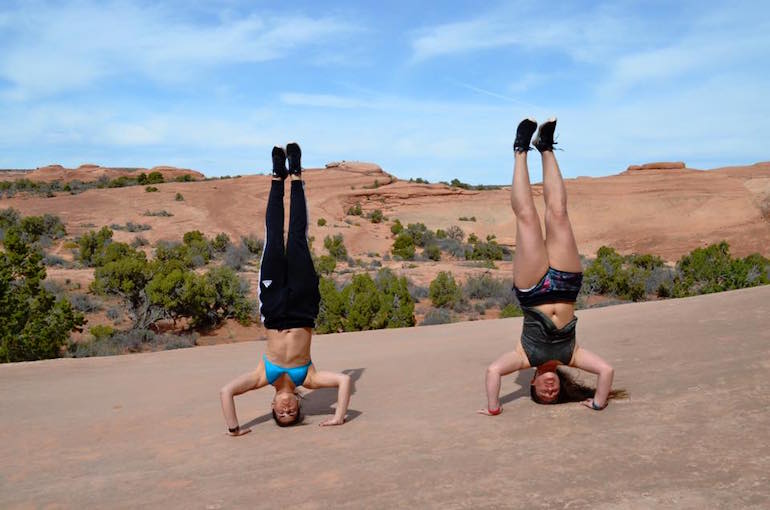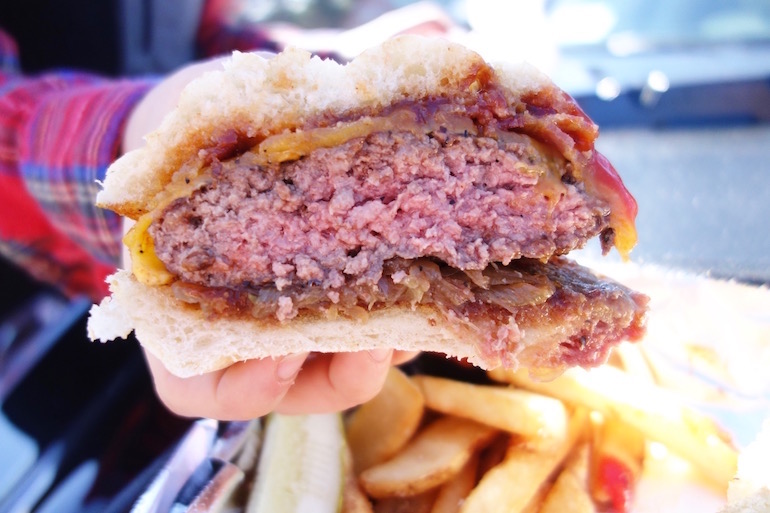Growing up, I was a pretty picky eater. My brother still makes fun of me for refusing to eat anything other than chicken tenders and mac ‘n’ cheese. However, if there was anything I rarely rejected, it was meat. From microwaveable bacon to barbecue ribs — I could eat a whole rack by myself at a disturbingly young age — to filet mignon, I savored it all.
One time in high school during Spanish class, we were practicing vocabulary, and I ended up rambling, “Me gusta carne roja” (translation: “I like red meat”). Sexual innuendos aside, some of my classmates affectionately started calling me “Chica de Carne” (“Meat Girl”). Cute nickname, right?

GIF courtesy of giphy.com
Much to my surprise, once I got to college, people started making observations about my eating habits that I had never noticed (nor received) before. Even after knowing me for months, my friends would ask me, “Aren’t you a vegetarian?” every time I ate meat in front of them. Mid-chew on a mouthful of my bacon cheeseburger, I would answer, “Uh, obviously not.”
The more often people asked me that question, the more curious I became. Why did everyone think I was a vegetarian? So, I eventually decided to start asking them. The responses I got were simple, yet extremely puzzling to me: “You’re small and cute.” “You’re kind of a hipster.” “You just look like a vegetarian.”
Okay, don’t get me wrong — I’m not complaining about being called cute. What I am trying to figure out is why certain body types are perceived as indicating a certain set of eating habits. Furthermore, people are praised or criticized for the same reasons.

Photo courtesy of Michelle Krameisen
For example, Jennifer Lawrence is admired for a diet of McDonald’s and cupcakes, while Melissa McCarthy is blatantly shamed for her weight, regardless of how healthily she eats. When the model in a Hardee’s commercial suggestively bites into a chicken tender or Cara Delevingne chows down on an In-N-Out burger, everyone cheers. But if an overweight woman were to do the same thing, people would flip out.
This past spring semester, I studied female college students’ eating habits for my senior seminar class on ethnographic research that I took to complete my folklore minor. After hours of fieldwork and a variety of interviews, I began to understand why people so often thought I was a vegetarian.
The peers who I interviewed for my research all seemed to allude to the same concept — that we immediately jump to conclusions about someone’s lifestyle based off of his or her body type. In one interview during which I showed my informants a slideshow containing photos of different women’s consumption of different foods, this was extremely prevalent.
When shown a picture of a thin woman eating a salad, they assumed that was her everyday food of choice; when shown a picture of a larger woman eating a salad, they assumed she must be on a diet. Conversely, when shown a picture of a larger woman eating a burger, they assumed that was her everyday food of choice; when shown a picture of a thin woman eating a burger, they assumed she was having a cheat day.

Photo courtesy of @caradelevingne on Twitter
At the end of the interview, my peers admitted that they felt bad for categorizing people in such a way. They additionally acknowledged that it’s easy to do so when we are constantly bombarded with messages from the media and, consequently, the people around us.
In another interview, one of my friends observed that what we order at restaurants often depends on what the other people at the table are ordering, whether we consciously recognize it or not. In her words, you’d be more likely to order a salad if all of your friends did so that you would feel just as healthy; on the other hand, if all of your friends ordered fries, everyone would feel as though they are “sinning” together.
On my 21st birthday, I went out to brunch with one of my best friends. For the special occasion, I ordered a huge meal of eggs, toast, bacon, a chocolate chip pancake, and a bowl of fruit. When our food arrived, the men at the table next to us snickered and asked, “How is a little girl like you going to eat all of that?” Annoyed, I answered, “I’m going to eat it.” Potential stomach discomfort aside, I crushed all of it.

GIF courtesy of jehassis.tumblr.com
What does this have to do with my friends’ assumption-turned-inside-joke that I must be a vegetarian? The point is that we project categories, ideas, and judgements onto other people simply due to our perceptions of their bodies. Granted, that doesn’t mean everyone does it with ill intent — but that still doesn’t change the potential implications.
At the end of the day, being small or cute or hipster or whatever does not mean I can’t appreciate a nice, juicy steak. Even if I didn’t eat meat, that wouldn’t be dependent on my appearance (and vice versa). Maybe we should stop preaching, “You are what you eat,” and just eat. Let a girl enjoy her bacon cheeseburger, okay?

Photo by Madeleine Cohen


